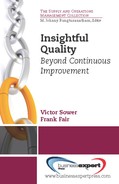I found the book very interesting and a very “quick read”—it has a nice direct, concise style/pace. Chapter 1 does a great job of grabbing your attention, and Chapter 2 sets the stage for things to come. I appreciated the use of current examples. To me Chapters 3, 4, and 5 pulled it all together, starting first with the individual (Insight); then the organization; and then the “new ways of thinking for managers.” I found the section, “Managers are Not Just Scientists and Engineers at a Higher Organizational Level” to be excellent—very helpful with issues about moving Principle Investigators to the “accidental Profession” of project management. I particularly liked your kindness of not presenting this as another example of the Peter Principle—in fact you even went the additional mile to explain why it was not. The fundamentals of Change Management are well done. Overall, I would say: An insightful quick read that pulls it all together.
—John Helmick, PMP, Principal, ICF International
Talk about a best kept secret! The authors capture the attention of a diverse audience, including academics and practitioners, in providing a forum for developing insightful leadership that will help organizations shift from traditional ways of thinking to adopting new paradigms. Interestingly, they include rich quotations that fit each context. And, they provide interesting descriptions of emerging technologies, as well as unique examples of evolving product uses, from adhesives to burrs to baking soda. This truly is an inspiring and insightful book, and using one’s imagination in reading it only can enhance its impact. They’ve truly let their secrets out of the bag. Maybe that’s another take on “insight.”
—Dr. Kathleen Utecht, PHR, Professor of Management, Sam Houston State University
Sower and Fair’s book is a must-read for business executives and quality practitioners who want to take their organizations to the next level. After handily demonstrating that continuous improvement is not enough, this book explains that insight is the secret ingredient of success. You’ll leave this book with a new understanding of the word insight and how it applies to business. This book will teach you how to develop insightful strategic plans and get more “juice” from traditional quality tools. However, above all else, this book makes the point that it is the quality of your thought that matters most. In the end, it is not a strategic planning process or a tool that will take your organization to the next level—it is the level of insight permeating the organization that makes all the difference. This book shows you how to be truly insightful!
—Lisa Shumway, Manager, Consulting and Management Development Group, American General Life Companies
I found a wealth of wonderful cases dealing with the authors’ view of “paradigm shifts” or what happens when the “…rules of the game change in the middle of the game?” The chapters are structured with a beginning quote or teaser. Each quote speaks to broader point(s) advanced in the chapter. These introductory quotes are supplemented by further quotes spaced throughout the chapter; for instance, Chapter 4 includes quotes from Winston Churchill, Paul Hawken, Henry Ford, Irving Berlin, and George Hackett. Many will be introduced to new names (e.g., Tuominen in Chapter 6 and Vinod Khosla in Chapter 1 were new to this reader), but the reader is always treated in a respectful way, never in a condescending manner. The chapters are fast-moving and full of useful points about the business enterprise. It was a pleasure to share the experience with this book. The book makes many good points, all made in interesting and fresh ways. As a university teacher, this book has expanded my world view by introducing me to important, but neglected, areas of serious thinking about the current condition of the business enterprise.
—Dr. Donald Bumpass, Professor of Economics, Sam Houston State University
Sower and Fair’s book on managing for insight and innovation is a little jewel and should be read by anyone in a management role in any sort of organization: corporate, charitable, or educational. They integrate in a clear and insightful manner important ideas and examples from Platonic philosophy, the history of science, business management, and cognitive psychology into a general theory of how to avoid the known hazards of continuous, incremental improvement by creating an environment that maximizes the odds for insightful and innovative changes that will lead to the continued success of the organization.
—Dr. Donald Hatcher, Professor of Philosophy, Director of Liberal Arts and Critical Thinking Program, Baker University
